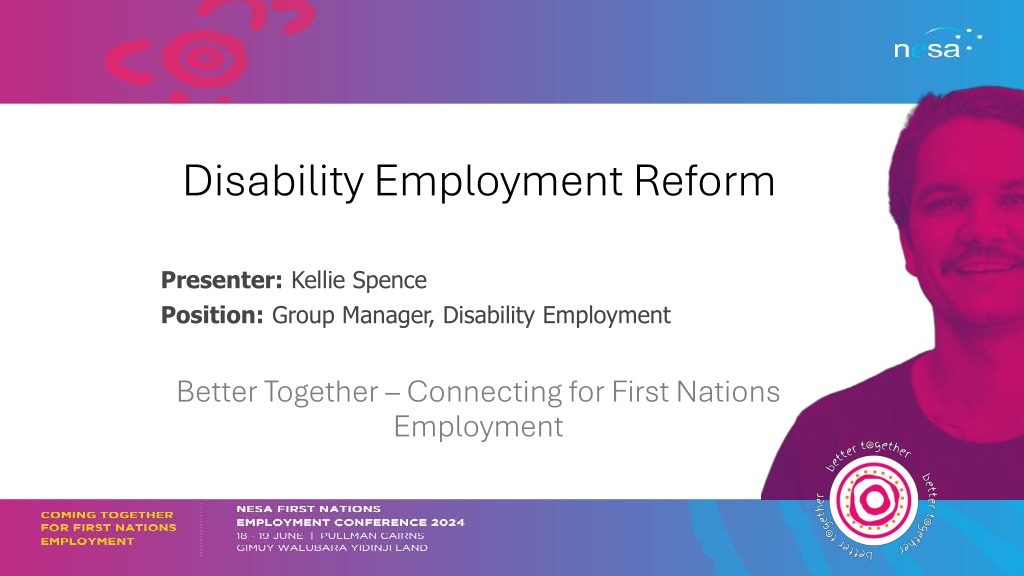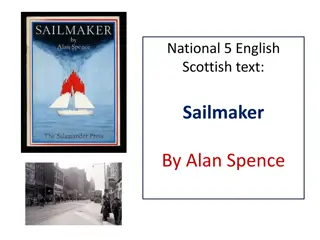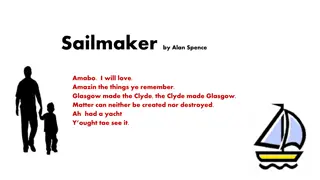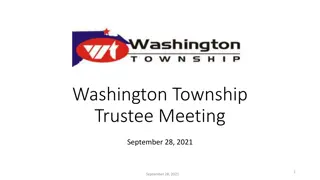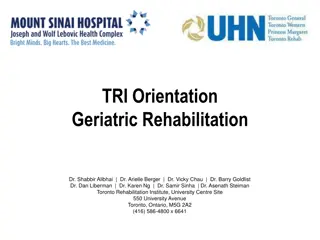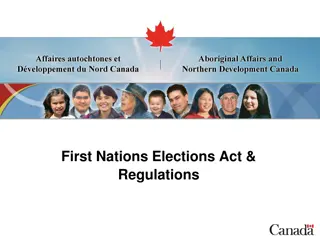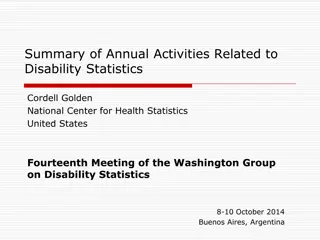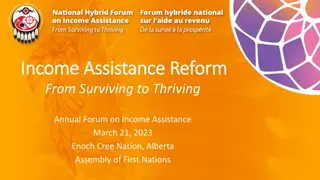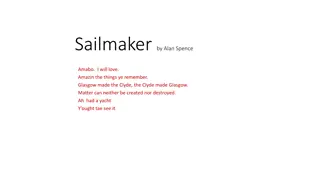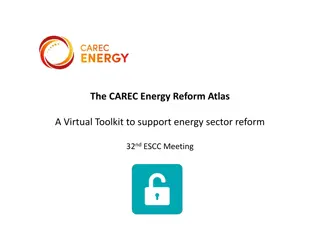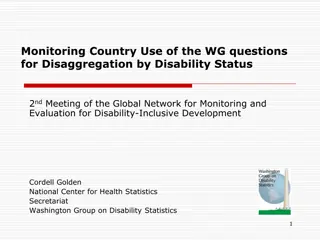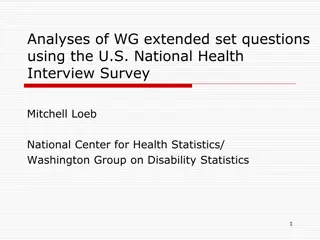Disability Employment Reform Presentation by Kellie Spence - Better Together Connecting for First Nations Employment
Group Manager Kellie Spence presents on the Disability Employment Reform, focusing on improving employment outcomes for First Nations peoples with disabilities. The presentation covers key topics such as program changes, market strategy, and current statistics, highlighting the need for a new specialist disability employment program starting July 2025. The program aims to simplify processes, strengthen relationships, and enhance employment opportunities for individuals with disabilities.
Download Presentation

Please find below an Image/Link to download the presentation.
The content on the website is provided AS IS for your information and personal use only. It may not be sold, licensed, or shared on other websites without obtaining consent from the author. Download presentation by click this link. If you encounter any issues during the download, it is possible that the publisher has removed the file from their server.
E N D
Presentation Transcript
Disability Employment Reform Presenter: Kellie Spence Position: Group Manager, Disability Employment Better Together Connecting for First Nations Employment
Acknowledgement of Country The Department of Social Services acknowledges the traditional custodians of the land on which we meet today and their connections to land, water, culture and community. We pay our respects to the elders past and present and extend that respect to all Aboriginal and Torres Strait Islander peoples today.
Probity Statement The Department of Social Services is committed to conducting a fair, honest, and transparent process for the design and implementation of the new specialist disability employment program and related services. For today's event, this means that: - this presentation will be made publicly available on the DSS Engage website - any views expressed, or information provided, by attendees to this event will be considered, along with the views expressed and information provided by other stakeholders. 3
Overview Key Topics The new disability employment program commences 1 July 2025 1. Overview of current stats 2. Changes to program design 3. Market strategy 4. Some questions
First Nations peoples Represent 3.8 per cent of the total Australian population (AIHW, 2021) Are 8.1 per cent of the total DES cohort (20,573 as at 30 Nov 2023). Are 1.9 times more likely to have a disability (SDAC 2018-19). Have a 12 per cent unemployment rate in 2021 compared to 5.12 per cent for all Australians (ABS 2021). Achieve lower DES Employment outcomes than the total cohort: 13 weeks 35% 39% 26 weeks 28% 34% 52 weeks 18% 22% First Nation peoples in DES Total DES program participants
First Nations participants in each ESA Proportion of indigenous participants in an Employment Service Area (as percentage of caseload) Number of indigenous participants in an Employment Service Area (as actual caseload)
Simplified program design From 1 July 2025 a new specialist disability employment program will help more people with disability, injury and/or a health condition to prepare for, find and maintain sustainable employment. The simplified program design will: Create stronger person-centred relationships between providers, participants and employers. Support employers to build capability to employ people with disability and identify and tailor job opportunities. Be less complex and require less administration, to increase focus on service quality and outcomes. 7
Participant eligibility for the new program The new program continues to target those who will benefit most from a specialist disability employment program. Eligibility will be expanded to support new volunteer cohorts. An additional 15,000 people each year are expected to register including: those with a work capacity of less than 8 hours per week, and those not receiving an income support payment. The 2-year service limit has been removed so participants will have an ongoing relationship with their provider for as long as they need. The effectiveness of the new program for the volunteer cohorts captured by the expanded eligibility arrangements will be assessed to determine if the arrangements should continue beyond the end of June 2028.
New approach to employment assistance Two service offers intensive and flexible, to reflect the individual needs of participants. Providers will offer a range of customised supports to participants depending on where they are in their employment journey and their capacity to participate. Providers will explore options and pathways to employment with participants under both services and build trust through a Job Plan that is participant led. Intensive Service Flexible Service The intensive service is the default for those who are preparing for work and looking for work. The flexible service targets participants who are already engaged in other activities (such as work, training or non-vocational supports) or need to build their capacity to fully engage. 9
Meaningful engagement Participant views will be heard and respected. Engagement will be through the delivery of a quality service that focuses on shared employment goals led by the participant and assisted by the provider. Less reliance on compliance to drive initial engagement. Requirements met through meaningful engagement, with voluntary activities in Job Plan. Option to increase details of requirements in the Job Plan if needed. 10
Support once in employment Providers will offer assistance to both their participants and their employers to make sure they have the support needed to succeed. In-employment support includes post-placement support for participants who have secured work and ongoing support for those who need longer-term support to keep their job. Work Assist for those already in employment, but who need support to maintain it, will become part of Ongoing Support. 11
Employer engagement and support Employers will be able to receive advice and guidance on recruitment and workplace practices that build their confidence and capability to employ people with disability. This support will help employers improve disability recruitment practices and attract people with disability into their workplace. Providers will also offer specialised assistance for workplace adjustments, additional training, job customisation and other supports. Employer support will also continue through the existing JobAccess program. Access to a wage subsidy of up to $10,000 per person, with simplified administration, to help participants and employers achieve sustained employment. 12
Market strategy The new program aims to strengthen the quality and diversity of providers. Specialist providers with deep expertise in a participant cohort will be encouraged. Balance market controls that support the viability of smaller and more specialist providers to enter or re-enter the market. Increase diversity and participant choice and control. Employment Service Areas (ESAs) remain the same. 13
National Panel of Assessors and Disability Employment Centre for Excellence National Panel of Assessors (NPA) Centre of Excellence The NPA program is a standing panel of independent assessment service providers contracted to provide assessments to support the needs of people with disability in the workplace. The Centre of Excellence will be an evidence- informed, best-practice hub that will focus on providing resources and tools to help employment service providers deliver disability aware quality services to both clients with disability and employers. The NPA program will continue to provide high-quality assessment services from 1 July 2025. The Centre is intended to commence in March 2025, and share evidence-based best practice resources.
Questions We want to hear from you: Will the proposed changes for Specialist providers be beneficial to encourage new First Nations specialist disability employment providers? Are there aspects of the proposed market structure that might stop a First Nations provider or First Nations organisation from applying to be a specialist provider? What else might encourage First Nations specialist providers to enter the market? 15
Feedback and more information New information will be made available through the Department of Social Services (dss.gov.au/new-specialist-disability-employment-program) and DSS Engage <engage.dss.gov.au> Email: DESConsultations@dss.gov.au 16
